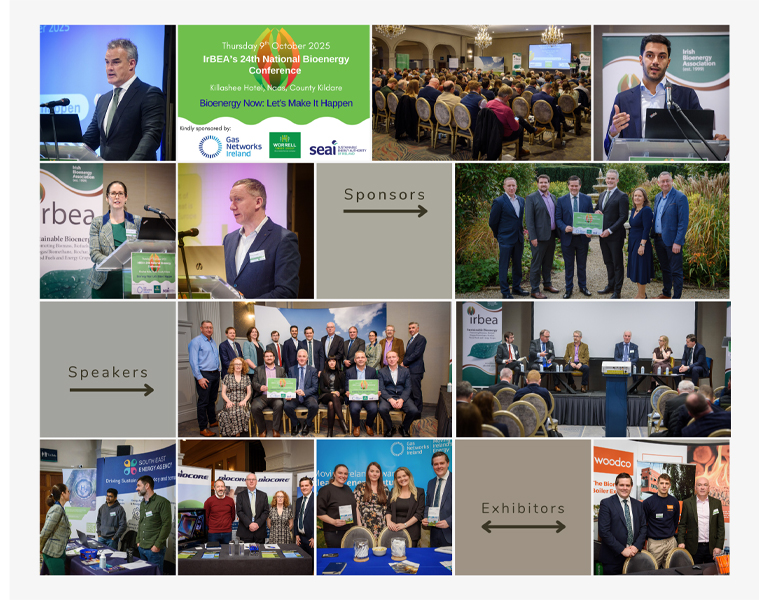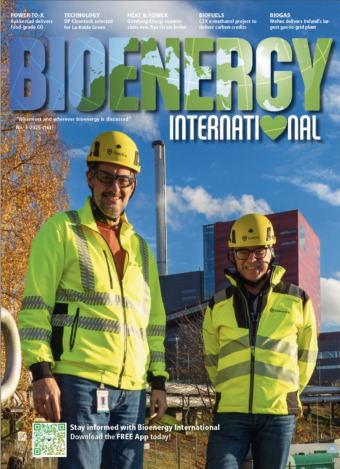The Irish Bioenergy Association (IrBEA) recently held its 24th National Bioenergy Conference in Naas, Co. Kildare. The event, titled “Bioenergy Now: Let’s make it happen”, brought together industry leaders, policymakers, and stakeholders from across the renewable energy sector.
Sponsored by Gas Networks Ireland (GNI), the Sustainable Energy Authority of Ireland (SEAI), and Worrell Timber Group, Maurice Ryan, President of the Irish Bioenergy Association and Director of Business Development at Green Belt, highlighted the urgency of advancing bioenergy solutions in Ireland in his opening address.
There is no doubt that the time for bioenergy is now, given the challenges facing us in terms of climate change, decarbonisation, and delivery on Ireland’s renewable energy targets. There is a significant opportunity and great potential for all forms of bioenergy, including the role of forestry and timber production as valuable income drivers in rural communities. It is incumbent on the government and industry to further encourage the forestry programme, increase land availability for forestry and woodland development, and work towards attaining our climate targets. The bioenergy sector, and the renewable heat it produces using solid biomass, are key enablers of sustainable forest management and the maximisation of forest potential for timber production, Maurice Ryan said.
Throughout the day, speakers and panel discussions explored the wide-ranging potential for solid biomass, biogas/biomethane, liquid biofuels, biochar, wood fuels, and energy crops to contribute to Ireland’s decarbonisation journey.
Seán Finan, CEO of the Irish Bioenergy Association, emphasised the progress being made and the need for swift policy action:
The building blocks for the development of the Irish bioenergy industry are beginning to line up. We now need to see an acceleration in the rollout of key policy and legislative frameworks to bring projects forward and drive action on the ground in project development, Seán Finan said.
Key takeaways across biogas/biomethane (RNG), solid biomass, wood fuels, and liquid biofuels included:
- Implementation of the Renewable Heat Obligation (RHO) scheme as quickly as possible, urgent notification of the RHO scheme to the EU Commission, inclusion of solid biomass as an eligible fuel under the RHO, and publication of RHO scheme ambitions to 2035 and beyond.
- Release of capital funding details for biomethane development, introduction of a minimum 50 percent capital support for farm-scale biogas plants, and addressing of planning, licensing, and regulatory barriers.
- Extension of the Support Scheme for Renewable Heat (SSRH) to the Emissions Trading System (ETS) sector, removal of the current 1 MW cap under the SSRH, enhanced Government and industry recognition of solid biomass as the most cost-effective renewable heat source, and improved enforcement of solid fuel regulations.
- Legislation mandating a minimum inclusion of Irish-produced biodiesel in future blending rates (B10/B20), actions to address fraudulent or unsustainable non-EU biofuels undermining domestic producers, and measures to grow and support indigenous biofuel production.
- Recognition of biochar in national carbon removal frameworks and policy, enhanced research into biochar applications, and promotion of biochar’s role in reducing emissions in construction, agriculture, and bio-based materials.
In closing, Seán Finan reaffirmed IrBEA’s commitment to driving progress.
IrBEA and its members are eager to meaningfully contribute to decarbonisation, emissions reductions, and renewable energy targets. We are ready to take the next steps to make bioenergy happen now, concluded Seán Finan.



